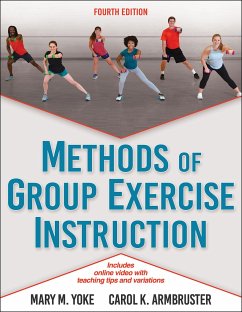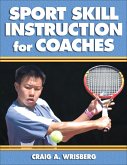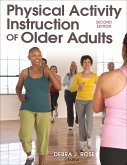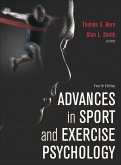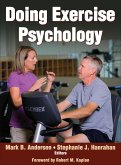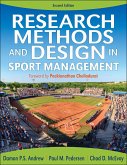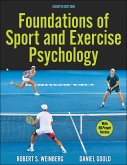- Broschiertes Buch
- Merkliste
- Auf die Merkliste
- Bewerten Bewerten
- Teilen
- Produkt teilen
- Produkterinnerung
- Produkterinnerung
Methods of Group Exercise Instruction highlights a variety of group exercise formats and offers expert guidance in group exercise training principles, correction and progression techniques, cueing, and safety tips.
Andere Kunden interessierten sich auch für
![Sport Skill Instruction for Coaches Sport Skill Instruction for Coaches]() Craig A. WrisbergSport Skill Instruction for Coaches50,99 €
Craig A. WrisbergSport Skill Instruction for Coaches50,99 €![Physical Activity Instruction of Older Adults-2nd Edition Physical Activity Instruction of Older Adults-2nd Edition]() Debra RosePhysical Activity Instruction of Older Adults-2nd Edition131,99 €
Debra RosePhysical Activity Instruction of Older Adults-2nd Edition131,99 €![Advances in Sport and Exercise Psychology Advances in Sport and Exercise Psychology]() Advances in Sport and Exercise Psychology119,99 €
Advances in Sport and Exercise Psychology119,99 €![Doing Exercise Psychology Doing Exercise Psychology]() Mark B. AndersenDoing Exercise Psychology86,99 €
Mark B. AndersenDoing Exercise Psychology86,99 €![Research Methods and Design in Sport Management-2nd Edition Research Methods and Design in Sport Management-2nd Edition]() Damon AndrewResearch Methods and Design in Sport Management-2nd Edition109,99 €
Damon AndrewResearch Methods and Design in Sport Management-2nd Edition109,99 €![Foundations of Sport and Exercise Psychology Foundations of Sport and Exercise Psychology]() Robert S. WeinbergFoundations of Sport and Exercise Psychology158,99 €
Robert S. WeinbergFoundations of Sport and Exercise Psychology158,99 €![The Urban Sketching Handbook 101 Sketching Tips The Urban Sketching Handbook 101 Sketching Tips]() Stephanie BowerThe Urban Sketching Handbook 101 Sketching Tips18,99 €
Stephanie BowerThe Urban Sketching Handbook 101 Sketching Tips18,99 €-
-
Methods of Group Exercise Instruction highlights a variety of group exercise formats and offers expert guidance in group exercise training principles, correction and progression techniques, cueing, and safety tips.
Hinweis: Dieser Artikel kann nur an eine deutsche Lieferadresse ausgeliefert werden.
Hinweis: Dieser Artikel kann nur an eine deutsche Lieferadresse ausgeliefert werden.
Produktdetails
- Produktdetails
- Verlag: Human Kinetics Publishers
- 4 ed
- Seitenzahl: 440
- Erscheinungstermin: 26. Juli 2019
- Englisch
- Abmessung: 216mm x 272mm x 22mm
- Gewicht: 1032g
- ISBN-13: 9781492571766
- ISBN-10: 1492571768
- Artikelnr.: 54926327
- Herstellerkennzeichnung
- Libri GmbH
- Europaallee 1
- 36244 Bad Hersfeld
- 06621 890
- Verlag: Human Kinetics Publishers
- 4 ed
- Seitenzahl: 440
- Erscheinungstermin: 26. Juli 2019
- Englisch
- Abmessung: 216mm x 272mm x 22mm
- Gewicht: 1032g
- ISBN-13: 9781492571766
- ISBN-10: 1492571768
- Artikelnr.: 54926327
- Herstellerkennzeichnung
- Libri GmbH
- Europaallee 1
- 36244 Bad Hersfeld
- 06621 890
Mary Yoke, PhD, FACSM, is a full-time faculty member at both Indiana University–Purdue University at Indianapolis (IUPUI) and Indiana University (IU) at Bloomington, teaching for the departments of kinesiology and applied health science. Prior to her current appointment, she was an adjunct professor at William Paterson University in New Jersey and a senior adjunct faculty member at Adelphi University in New York, where she authored numerous group exercise research studies. Yoke has a PhD in health behavior, a master’s degree in exercise physiology, and two degrees in music, and she has obtained 24 certifications in fitness. She has frequently served as a fitness video consultant and reviewer for Shape, Consumer Reports, and Good Housekeeping , and she has served as an expert witness in lawsuits involving injuries related to fitness videos. Yoke has worked in the areas of cardiac rehab, physical therapy, and corporate fitness and health promotion, and she has taught in the commercial health club setting for 25 years. A fellow of the American College of Sports Medicine (ACSM), Yoke is an associate research editor for ACSM’s Health & Fitness Journal and has written the Research Bites column three times per year since 2013. She has served for over six years on ACSM’s credentialing committee and more than three years on ACSM’s summit programming committee. She was on the adjunct board of the Aerobics and Fitness Association of America (AFAA), was a master trainer and certification specialist for AFAA for 30 years, and is a frequent speaker at national and international fitness conferences. She has presented in 49 U.S. states and has led workshops in 18 countries. Yoke is the author or coauthor of the books 101 Nice-to-Know Facts About Happiness (2015), AFAA’s A Guide to Personal Fitness Training (1996, 2001), Functional Exercise Progressions (2004), Methods of Group Exercise Instruction (2003, 2009, 2014, 2020), and AFAA’s Personal Fitness Training: Theory and Practice (2006, 2010). She is featured in six educational videos and numerous online courses. Carol K. Armbruster, PhD, FACSM, is a senior lecturer in the department of kinesiology in the School of Public Health at Indiana University (IU) at Bloomington. During her more than 35 years of teaching college students and training fitness leaders, she has served on the American College of Sports Medicine (ACSM) and American Council on Exercise (ACE) credentialing committees. She is also an ACSM-certified exercise physiologist, holds the level 2 Exercise Is Medicine credential, and has level 1 Functional Movement Screening certification. She previously served as a program director of fitness and wellness for the IU Division of Recreational Sports, where she managed a program that offered more than 100 group exercise sessions per week. Prior to working at IU, Armbruster worked at the University of Illinois, Colorado State University, Rocky Mountain Health Club, the Loveland (Colorado) Parks and Recreation Department, and the Sheboygan (Wisconsin) School District. Armbruster enjoys combining her interests of teaching, community engagement, and translational research. She is a senior editor for Translational Journal of the American College of Sports Medicine and is on the board of directors for the ACSM Exercise Is Medicine initiative. Her doctoral work focused on translational research of active-duty military in the over-40 age population. She is especially interested in functional movement, worksite wellness outcomes, safe and effective movement instruction, and evaluating safe and effective outcome-based physical activity and movement program delivery methods in order to encourage healthy lifestyles and focus on improved quality of life and prevention of illness.
Part I. Fundamentals of Group Exercise Instruction
Chapter 1. Best Practices
Evolution of Group Exercise
Trends in Group Exercise
Education, Credentialing, and Certification
Creating Group Cohesion
Student-Centered Versus Teacher-Centered Instruction
Instructors as Role Models
Creating a Healthy Emotional Environment
Basic Business Practices for Group Exercise
Chapter 2. Foundational Components
Integrating Components of Health Into Class Design
Principles of Muscle Balance
Balancing Strength and Flexibility
Range of Motion for Major Joints
Progressive Functional Training Continuum
Create the Preclass Environment
Chapter 3. Coaching-Based Concepts
Motivational Strategies for Coaching-Based Group Exercise
Creating Dynamic Team Environments
Exercise Modification for Injury Prevention
Demonstrating Proper Alignment and Giving a Variety of Cues
Programming Music in a Class That Is Not Beat-Based
Chapter 4. Beat-Based Techniques
Applying Music Skills in Group Exercise
Choreography
Basic Moves
Elements of Variation
Creating Smooth Transitions
Combinations
Additional Choreography Techniques
Cueing Methods in Group Exercise
Part II. Primary Elements of Group Exercise
Chapter 5. Warm-Up, Cool-Down, and Cardiorespiratory Training
Designing a Warm-Up
Evaluating Stretching in the Warm-Up
Designing a Cool-Down
Cardiorespiratory Training Systems
Beginning Intensity
Appropriate Intensity Levels
Intensity Monitoring
Principles of Muscle Balance in Cardiorespiratory Training
Safety Issues, Good Alignment, and Technique
Importance of Participant Interaction and Enjoyment
Cool-Down After the Cardio Segment
Chapter 6. Muscular Conditioning
Recommendations and Guidelines for Muscular Conditioning
Cueing Muscular Conditioning Exercises
Demonstrating Progressions, Regressions, Modifications, and Alternatives
Safety Issues in Muscular Conditioning
Equipment for Muscle Conditioning
Chapter 7. Flexibility Training
Recommendations and Guidelines for Flexibility Training
Cueing Flexibility Exercises
Safety Issues in Flexibility Training
Flexibility Exercises
End-of-Class Flexibility Work
Chapter 8. Neuromotor and Functional Training
Neuromotor Training Principles and Recommendations
Functional Training Principles
Safety Issues in Balance and Functional Training
Equipment for Balance and Functional Training
Teaching a Balance Class
Teaching a Functional Training Class
Chapter 9. Teaching Older Adults
Modalities in Group Exercise for Older Adults
Understanding Aspects of Aging Pertinent to Group Exercise
Guidelines and Special Considerations
Facilitating Social Connections in Group Exercise for Older Adults
Exercise Modifications for Deconditioned Older Adults
Teaching a Chair-Based Class for Older Adults
Part III. Group Exercise Modalities
Chapter 10. Kickboxing
Creating a Warm-Up
Technique and Safety Issues
Basic Moves
Combinations and Choreography Techniques
Other Kickboxing Formats
Chapter 11. Step Training
Creating a Warm-Up
Technique and Safety Issues
Basic Moves and Step Patterns
Basic Combinations and Choreography Techniques
Training Systems
Chapter 12. Stationary Indoor Cycling
Positioning, Alignment, and Safety
Creating a Warm-Up
Basic Moves
Formatting Indoor Cycling Classes
Intensity Monitoring
Cueing and Coaching Techniques
Chapter 13. Boot Camp and HIIT
Creating a Warm-Up
Equipment and Setup
Planning Safe, Effective Movements
Basic Moves
Chapter 14. Water Exercise
Benefits of Water Exercise
Properties of Water and Newton’s Laws of Motion
Creating a Warm-Up
Formatting Water Fitness Classes
Training Systems
Water Exercise Equipment
Chapter 15. Yoga
Philosophy of Yoga
Breathwork in Yoga
Beginning a Yoga Class
Verbal Cues and Music
Technique and Safety Issues
Equipment and Class Setting
Chapter 16. Pilates
The Pilates Method: Basic Principles
Creating a Warm-Up
Cueing in Pilates
Technique and Safety Issues
Ending a Pilates Class
Chapter 17. Other Modalities
Creating a Client-Centered Group Exercise Class
Group Exercise for Niche Markets
Lifestyle-Based Physical Activity Classes
Dance-Based Classes
Equipment-Based Cardiorespiratory and Strength Training
Mind–Body Classes
Fusion Classes
Ethical Practice Guidelines for Group Fitness Instructors
Appendix A. Group Exercise Class Evaluation Form
Appendix B. PAR-Q+
Appendix C. Sample Workout Plans
Appendix D. Joint Action Tables
Appendix E. ROM Tables
Chapter 1. Best Practices
Evolution of Group Exercise
Trends in Group Exercise
Education, Credentialing, and Certification
Creating Group Cohesion
Student-Centered Versus Teacher-Centered Instruction
Instructors as Role Models
Creating a Healthy Emotional Environment
Basic Business Practices for Group Exercise
Chapter 2. Foundational Components
Integrating Components of Health Into Class Design
Principles of Muscle Balance
Balancing Strength and Flexibility
Range of Motion for Major Joints
Progressive Functional Training Continuum
Create the Preclass Environment
Chapter 3. Coaching-Based Concepts
Motivational Strategies for Coaching-Based Group Exercise
Creating Dynamic Team Environments
Exercise Modification for Injury Prevention
Demonstrating Proper Alignment and Giving a Variety of Cues
Programming Music in a Class That Is Not Beat-Based
Chapter 4. Beat-Based Techniques
Applying Music Skills in Group Exercise
Choreography
Basic Moves
Elements of Variation
Creating Smooth Transitions
Combinations
Additional Choreography Techniques
Cueing Methods in Group Exercise
Part II. Primary Elements of Group Exercise
Chapter 5. Warm-Up, Cool-Down, and Cardiorespiratory Training
Designing a Warm-Up
Evaluating Stretching in the Warm-Up
Designing a Cool-Down
Cardiorespiratory Training Systems
Beginning Intensity
Appropriate Intensity Levels
Intensity Monitoring
Principles of Muscle Balance in Cardiorespiratory Training
Safety Issues, Good Alignment, and Technique
Importance of Participant Interaction and Enjoyment
Cool-Down After the Cardio Segment
Chapter 6. Muscular Conditioning
Recommendations and Guidelines for Muscular Conditioning
Cueing Muscular Conditioning Exercises
Demonstrating Progressions, Regressions, Modifications, and Alternatives
Safety Issues in Muscular Conditioning
Equipment for Muscle Conditioning
Chapter 7. Flexibility Training
Recommendations and Guidelines for Flexibility Training
Cueing Flexibility Exercises
Safety Issues in Flexibility Training
Flexibility Exercises
End-of-Class Flexibility Work
Chapter 8. Neuromotor and Functional Training
Neuromotor Training Principles and Recommendations
Functional Training Principles
Safety Issues in Balance and Functional Training
Equipment for Balance and Functional Training
Teaching a Balance Class
Teaching a Functional Training Class
Chapter 9. Teaching Older Adults
Modalities in Group Exercise for Older Adults
Understanding Aspects of Aging Pertinent to Group Exercise
Guidelines and Special Considerations
Facilitating Social Connections in Group Exercise for Older Adults
Exercise Modifications for Deconditioned Older Adults
Teaching a Chair-Based Class for Older Adults
Part III. Group Exercise Modalities
Chapter 10. Kickboxing
Creating a Warm-Up
Technique and Safety Issues
Basic Moves
Combinations and Choreography Techniques
Other Kickboxing Formats
Chapter 11. Step Training
Creating a Warm-Up
Technique and Safety Issues
Basic Moves and Step Patterns
Basic Combinations and Choreography Techniques
Training Systems
Chapter 12. Stationary Indoor Cycling
Positioning, Alignment, and Safety
Creating a Warm-Up
Basic Moves
Formatting Indoor Cycling Classes
Intensity Monitoring
Cueing and Coaching Techniques
Chapter 13. Boot Camp and HIIT
Creating a Warm-Up
Equipment and Setup
Planning Safe, Effective Movements
Basic Moves
Chapter 14. Water Exercise
Benefits of Water Exercise
Properties of Water and Newton’s Laws of Motion
Creating a Warm-Up
Formatting Water Fitness Classes
Training Systems
Water Exercise Equipment
Chapter 15. Yoga
Philosophy of Yoga
Breathwork in Yoga
Beginning a Yoga Class
Verbal Cues and Music
Technique and Safety Issues
Equipment and Class Setting
Chapter 16. Pilates
The Pilates Method: Basic Principles
Creating a Warm-Up
Cueing in Pilates
Technique and Safety Issues
Ending a Pilates Class
Chapter 17. Other Modalities
Creating a Client-Centered Group Exercise Class
Group Exercise for Niche Markets
Lifestyle-Based Physical Activity Classes
Dance-Based Classes
Equipment-Based Cardiorespiratory and Strength Training
Mind–Body Classes
Fusion Classes
Ethical Practice Guidelines for Group Fitness Instructors
Appendix A. Group Exercise Class Evaluation Form
Appendix B. PAR-Q+
Appendix C. Sample Workout Plans
Appendix D. Joint Action Tables
Appendix E. ROM Tables
Part I. Fundamentals of Group Exercise Instruction
Chapter 1. Best Practices
Evolution of Group Exercise
Trends in Group Exercise
Education, Credentialing, and Certification
Creating Group Cohesion
Student-Centered Versus Teacher-Centered Instruction
Instructors as Role Models
Creating a Healthy Emotional Environment
Basic Business Practices for Group Exercise
Chapter 2. Foundational Components
Integrating Components of Health Into Class Design
Principles of Muscle Balance
Balancing Strength and Flexibility
Range of Motion for Major Joints
Progressive Functional Training Continuum
Create the Preclass Environment
Chapter 3. Coaching-Based Concepts
Motivational Strategies for Coaching-Based Group Exercise
Creating Dynamic Team Environments
Exercise Modification for Injury Prevention
Demonstrating Proper Alignment and Giving a Variety of Cues
Programming Music in a Class That Is Not Beat-Based
Chapter 4. Beat-Based Techniques
Applying Music Skills in Group Exercise
Choreography
Basic Moves
Elements of Variation
Creating Smooth Transitions
Combinations
Additional Choreography Techniques
Cueing Methods in Group Exercise
Part II. Primary Elements of Group Exercise
Chapter 5. Warm-Up, Cool-Down, and Cardiorespiratory Training
Designing a Warm-Up
Evaluating Stretching in the Warm-Up
Designing a Cool-Down
Cardiorespiratory Training Systems
Beginning Intensity
Appropriate Intensity Levels
Intensity Monitoring
Principles of Muscle Balance in Cardiorespiratory Training
Safety Issues, Good Alignment, and Technique
Importance of Participant Interaction and Enjoyment
Cool-Down After the Cardio Segment
Chapter 6. Muscular Conditioning
Recommendations and Guidelines for Muscular Conditioning
Cueing Muscular Conditioning Exercises
Demonstrating Progressions, Regressions, Modifications, and Alternatives
Safety Issues in Muscular Conditioning
Equipment for Muscle Conditioning
Chapter 7. Flexibility Training
Recommendations and Guidelines for Flexibility Training
Cueing Flexibility Exercises
Safety Issues in Flexibility Training
Flexibility Exercises
End-of-Class Flexibility Work
Chapter 8. Neuromotor and Functional Training
Neuromotor Training Principles and Recommendations
Functional Training Principles
Safety Issues in Balance and Functional Training
Equipment for Balance and Functional Training
Teaching a Balance Class
Teaching a Functional Training Class
Chapter 9. Teaching Older Adults
Modalities in Group Exercise for Older Adults
Understanding Aspects of Aging Pertinent to Group Exercise
Guidelines and Special Considerations
Facilitating Social Connections in Group Exercise for Older Adults
Exercise Modifications for Deconditioned Older Adults
Teaching a Chair-Based Class for Older Adults
Part III. Group Exercise Modalities
Chapter 10. Kickboxing
Creating a Warm-Up
Technique and Safety Issues
Basic Moves
Combinations and Choreography Techniques
Other Kickboxing Formats
Chapter 11. Step Training
Creating a Warm-Up
Technique and Safety Issues
Basic Moves and Step Patterns
Basic Combinations and Choreography Techniques
Training Systems
Chapter 12. Stationary Indoor Cycling
Positioning, Alignment, and Safety
Creating a Warm-Up
Basic Moves
Formatting Indoor Cycling Classes
Intensity Monitoring
Cueing and Coaching Techniques
Chapter 13. Boot Camp and HIIT
Creating a Warm-Up
Equipment and Setup
Planning Safe, Effective Movements
Basic Moves
Chapter 14. Water Exercise
Benefits of Water Exercise
Properties of Water and Newton’s Laws of Motion
Creating a Warm-Up
Formatting Water Fitness Classes
Training Systems
Water Exercise Equipment
Chapter 15. Yoga
Philosophy of Yoga
Breathwork in Yoga
Beginning a Yoga Class
Verbal Cues and Music
Technique and Safety Issues
Equipment and Class Setting
Chapter 16. Pilates
The Pilates Method: Basic Principles
Creating a Warm-Up
Cueing in Pilates
Technique and Safety Issues
Ending a Pilates Class
Chapter 17. Other Modalities
Creating a Client-Centered Group Exercise Class
Group Exercise for Niche Markets
Lifestyle-Based Physical Activity Classes
Dance-Based Classes
Equipment-Based Cardiorespiratory and Strength Training
Mind–Body Classes
Fusion Classes
Ethical Practice Guidelines for Group Fitness Instructors
Appendix A. Group Exercise Class Evaluation Form
Appendix B. PAR-Q+
Appendix C. Sample Workout Plans
Appendix D. Joint Action Tables
Appendix E. ROM Tables
Chapter 1. Best Practices
Evolution of Group Exercise
Trends in Group Exercise
Education, Credentialing, and Certification
Creating Group Cohesion
Student-Centered Versus Teacher-Centered Instruction
Instructors as Role Models
Creating a Healthy Emotional Environment
Basic Business Practices for Group Exercise
Chapter 2. Foundational Components
Integrating Components of Health Into Class Design
Principles of Muscle Balance
Balancing Strength and Flexibility
Range of Motion for Major Joints
Progressive Functional Training Continuum
Create the Preclass Environment
Chapter 3. Coaching-Based Concepts
Motivational Strategies for Coaching-Based Group Exercise
Creating Dynamic Team Environments
Exercise Modification for Injury Prevention
Demonstrating Proper Alignment and Giving a Variety of Cues
Programming Music in a Class That Is Not Beat-Based
Chapter 4. Beat-Based Techniques
Applying Music Skills in Group Exercise
Choreography
Basic Moves
Elements of Variation
Creating Smooth Transitions
Combinations
Additional Choreography Techniques
Cueing Methods in Group Exercise
Part II. Primary Elements of Group Exercise
Chapter 5. Warm-Up, Cool-Down, and Cardiorespiratory Training
Designing a Warm-Up
Evaluating Stretching in the Warm-Up
Designing a Cool-Down
Cardiorespiratory Training Systems
Beginning Intensity
Appropriate Intensity Levels
Intensity Monitoring
Principles of Muscle Balance in Cardiorespiratory Training
Safety Issues, Good Alignment, and Technique
Importance of Participant Interaction and Enjoyment
Cool-Down After the Cardio Segment
Chapter 6. Muscular Conditioning
Recommendations and Guidelines for Muscular Conditioning
Cueing Muscular Conditioning Exercises
Demonstrating Progressions, Regressions, Modifications, and Alternatives
Safety Issues in Muscular Conditioning
Equipment for Muscle Conditioning
Chapter 7. Flexibility Training
Recommendations and Guidelines for Flexibility Training
Cueing Flexibility Exercises
Safety Issues in Flexibility Training
Flexibility Exercises
End-of-Class Flexibility Work
Chapter 8. Neuromotor and Functional Training
Neuromotor Training Principles and Recommendations
Functional Training Principles
Safety Issues in Balance and Functional Training
Equipment for Balance and Functional Training
Teaching a Balance Class
Teaching a Functional Training Class
Chapter 9. Teaching Older Adults
Modalities in Group Exercise for Older Adults
Understanding Aspects of Aging Pertinent to Group Exercise
Guidelines and Special Considerations
Facilitating Social Connections in Group Exercise for Older Adults
Exercise Modifications for Deconditioned Older Adults
Teaching a Chair-Based Class for Older Adults
Part III. Group Exercise Modalities
Chapter 10. Kickboxing
Creating a Warm-Up
Technique and Safety Issues
Basic Moves
Combinations and Choreography Techniques
Other Kickboxing Formats
Chapter 11. Step Training
Creating a Warm-Up
Technique and Safety Issues
Basic Moves and Step Patterns
Basic Combinations and Choreography Techniques
Training Systems
Chapter 12. Stationary Indoor Cycling
Positioning, Alignment, and Safety
Creating a Warm-Up
Basic Moves
Formatting Indoor Cycling Classes
Intensity Monitoring
Cueing and Coaching Techniques
Chapter 13. Boot Camp and HIIT
Creating a Warm-Up
Equipment and Setup
Planning Safe, Effective Movements
Basic Moves
Chapter 14. Water Exercise
Benefits of Water Exercise
Properties of Water and Newton’s Laws of Motion
Creating a Warm-Up
Formatting Water Fitness Classes
Training Systems
Water Exercise Equipment
Chapter 15. Yoga
Philosophy of Yoga
Breathwork in Yoga
Beginning a Yoga Class
Verbal Cues and Music
Technique and Safety Issues
Equipment and Class Setting
Chapter 16. Pilates
The Pilates Method: Basic Principles
Creating a Warm-Up
Cueing in Pilates
Technique and Safety Issues
Ending a Pilates Class
Chapter 17. Other Modalities
Creating a Client-Centered Group Exercise Class
Group Exercise for Niche Markets
Lifestyle-Based Physical Activity Classes
Dance-Based Classes
Equipment-Based Cardiorespiratory and Strength Training
Mind–Body Classes
Fusion Classes
Ethical Practice Guidelines for Group Fitness Instructors
Appendix A. Group Exercise Class Evaluation Form
Appendix B. PAR-Q+
Appendix C. Sample Workout Plans
Appendix D. Joint Action Tables
Appendix E. ROM Tables

